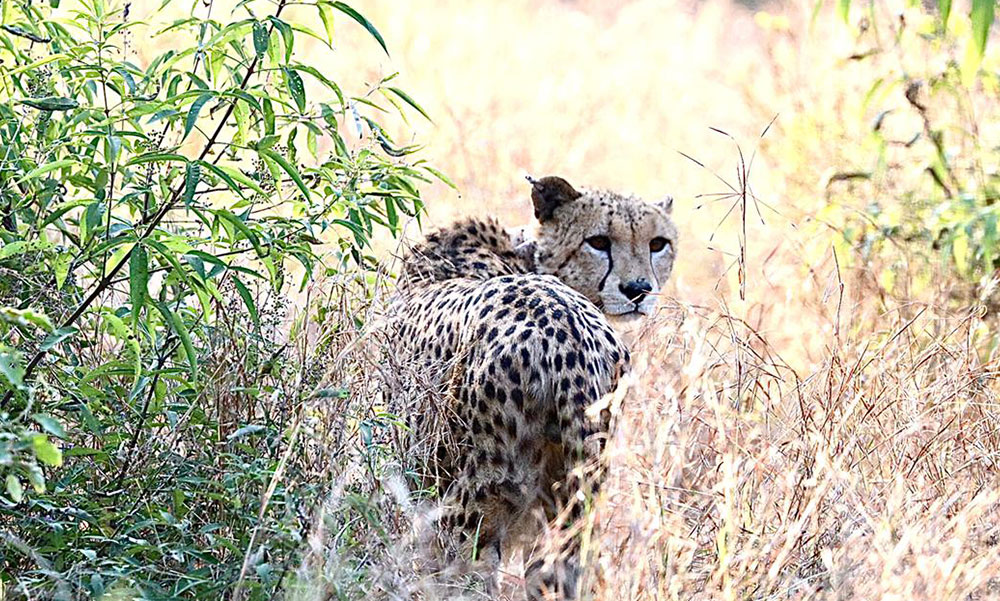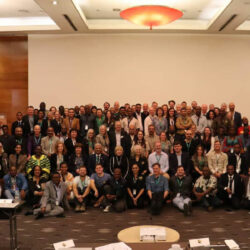Namibian ‘rockstars’ adapting to India, cheetahs make four kills in 10 days
-

- by CCF Staff November 17, 2022


Elton (left) and Freddie (right), the Namibian rockstar cheetahs, at Kuno National Park
BHOPAL, India — November 17, 2022 – Brothers Elton and Freddie are the first of eight cheetahs translocated from Namibia to India on Sept. 17 to successfully hunt on Indian soil. The big cats were gifted by the Namibian government to introduce a new population in India, which declared the species extinct in 1952.
At approximately 9am IST, on Tuesday, Nov. 8, Project Cheetah staff at Kuno National Park in Madhya Pradesh tracking the pair found remains of an adult chital in Boma 4, an Indian wild prey species stocked especially for the cats. Two days later the team found a second set of remains, then another three days after. On Nov. 15, a fourth chital carcass was discovered. From their appearance, staff could determine the cheetahs ate well.
On the two-month anniversary of arrival, news about the rockstars hunting is thrilling conservationists.
“The cheetah knows how to separate the intestines and stomach without rupture, but unlike the leopard, does not drag them far,” said Dr. MK Ranjitsihn, Chairman of Project Cheetah, a wildlife conservationist who drafted the Indian Wildlife Protection Act of 1972, has twice been the Director of Wildlife Protection of India, and was the Forest Secretary of the State of Madhya Pradesh in which capacity he established the sanctuary at Kuno National Park where the cheetah reintroduction is taking place. “News of this success made my day!”
The last time these two cheetahs made a kill would have been sometime in late July in Namibia before they were brought in from the wild to be prepared for translocation. From then until being moved into their hunting boma, staff from Project Cheetah had been providing their meals. Elton and Freddie were released into Boma 4 in the early evening of Saturday, Nov. 5, after being in a quarantine enclosure since arriving 49 days earlier. Within the first 36 hours, they made their first kill.
Elton and Freddie have taken down four adult chital in 10 days of being in the boma, a large enclosure where cheetahs are being introduced to the local prey species. So far, their meals have not been supplemented, confirms Project Cheetah staff. The cheetahs are being tracked using Very High Frequency (VHF) satellite collars. Staff are monitoring them constantly.
A cheetah can go days without water because they get the hydration they need from the blood in their prey. Cheetahs gorge themselves on a big enough meal to keep them going for two to five days. However, they will hunt daily, if opportunities are present. Successful hunting is a key indicator of the big cats’ acclimatization.
“Our whole cheetah team is so pleased to learn Elton and Freddie are hunting regularly now. Recognizing a new prey species as food is a great indicator they are adapting to their new environment in India. This is the first time a cheetah has successfully hunted in India in more than 75 years,” said Dr. Laurie Marker, Founder and Executive Director of Cheetah Conservation Fund (CCF) and advisor to Project Cheetah.
According to Dr. Marker, cheetahs typically hunt in the early morning and the early evening. They capture their prey by stalking within 10 to 30 meters or as far away as 80 meters before beginning to chase. An average chase lasts between 20 to 60 seconds, and only 10 percent of chases are successful. Brothers like Elton and Freddie will remain together for life and hunt in coalitions, so they can take down bigger species and increase chances for success.
There are less than 7,500 cheetahs remaining in the wild globally, and they now occupy a mere nine percent of their original range. Shrinking habitat attributed to climate change and growing human populations is a serious threat. India hopes translocating African cheetahs will help towards saving the country’s threatened landscapes. India’s forest reserves such as Kuno National Park offer suitable habitat for cheetahs, adds Dr. Marker.
“To save cheetahs from extinction, we need to create permanent places for them on Earth,” she said.
Indian Prime Minister Naendra Modi, who personally welcomed the cheetahs to Kuno National Park, is running a contest seeking suggestions for Indian names for the eight Namibian cats plus a new name for Project Cheetah. More than 32,500 entries were received. Results will soon be announced, per reports in Indian media. Winners will receive a trip to see the cheetahs once visitation is allowed.
Prashant Agrawal, High Commissioner of India to Namibia, who negotiated the deal to bring the cats to India, said, “Ever since their arrival, enormous effort and care has been devoted to the well-being of all eight cheetahs from Namibia. We are delighted that they are all doing well. We will continue with our intensive efforts towards next step in reintroduction plan, for which there is an unprecedented outpouring of public interest and goodwill.”
CCF is planning International Cheetah Day celebrations Dec. 4 at its Centre in Otjiwarongo, Namibia, the ‘Cheetah Capital of the World,’ and in Hargeisa, Somaliland. CCF is building a second Centre in Somaliland for cheetahs rescued from illegal wildlife trade. This year marks the 12th annual celebration of this day.
###
About CCF
Cheetah Conservation Fund (CCF) is the global leader in research and conservation of cheetahs and dedicated to saving the cheetah in the wild. CCF has created a set of integrated programmes based on its research to address threats to the cheetah and its ecosystem. Founded in 1990, CCF is an international non-profit organisation headquartered in Namibia with a field base in Somaliland. CCF celebrated its 32nd anniversary in 2022, making it the longest running and most successful cheetah conservation organisation. For more information, please visit www.cheetah.org
Media Contact:
Susan Yannetti, susan@cheetah.org or +12027167756
Related Reading

